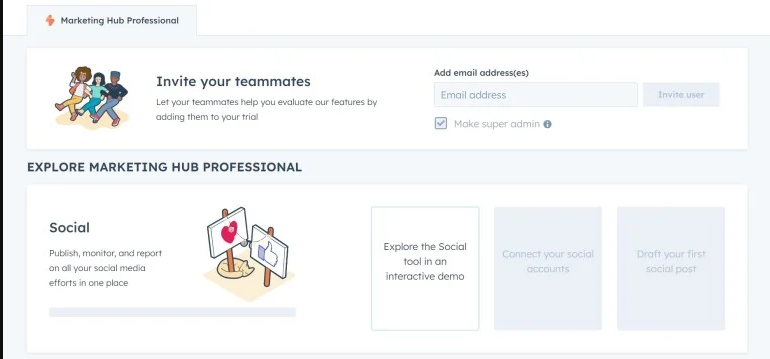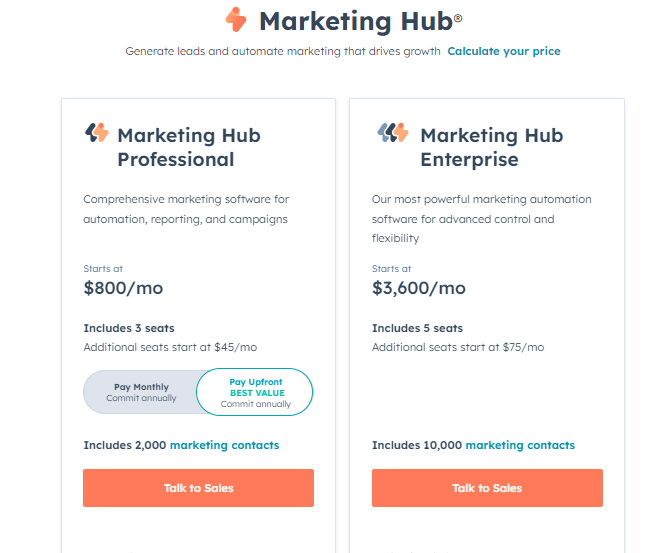Overview and Introduction
HubSpot is a leading all-in-one platform designed to help businesses with their marketing, sales, and customer service needs. Launched in 2006, HubSpot has grown into a comprehensive solution that offers a range of tools to streamline and enhance various aspects of business operations. It’s particularly popular among small to mid-sized companies but scales well for larger enterprises as well.
The platform integrates several key functionalities, including Customer Relationship Management (CRM), marketing automation, email marketing, content management, and analytics. This integration allows businesses to manage their customer interactions, track leads, and optimize their marketing strategies all from a single interface.
HubSpot stands out for its user-friendly interface and robust feature set, which is designed to improve efficiency and drive growth. With its focus on inbound marketing, HubSpot helps businesses attract, engage, and delight customers through content and personalized communication.
Core Features
HubSpot stands out with a robust suite of features designed to streamline and enhance various aspects of business operations. As an all-in-one platform, it integrates marketing, sales, and customer service functionalities, making it a versatile tool for businesses of all sizes.
Marketing Hub
The Marketing Hub offers tools for creating, managing, and optimizing marketing campaigns. Key features include email marketing, social media management, content creation, and lead generation. The platform provides powerful analytics to track campaign performance and optimize strategies.
Sales Hub
The Sales Hub is designed to boost sales productivity and effectiveness. It includes features such as a CRM system, sales pipeline management, email tracking, and automated follow-ups. The integrated tools help sales teams manage leads, track interactions, and close deals more efficiently.
Service Hub
The Service Hub focuses on enhancing customer support and service. It offers features like a helpdesk ticketing system, knowledge base, live chat, and customer feedback tools. These features help businesses provide excellent customer service and resolve issues quickly.
CMS Hub
The CMS Hub provides a content management system that allows users to create and manage website content. With tools for website design, SEO optimization, and content personalization, businesses can build and maintain a professional online presence.
Reporting and Analytics
HubSpot’s reporting and analytics tools provide insights into marketing, sales, and customer service performance. Customizable dashboards and detailed reports help businesses track key metrics, measure success, and make data-driven decisions.

Automation
the automation features enable businesses to streamline repetitive tasks. Marketing automation includes workflows for email campaigns, lead nurturing, and customer segmentation. Sales automation features include task reminders and follow-up sequences, while service automation helps manage support tickets and customer interactions efficiently.
Integration
HubSpot offers robust integration capabilities with a wide range of third-party applications and tools. This ensures seamless data flow between HubSpot and other systems your business may use, enhancing overall efficiency.
Hubspt Pricing and Plans
HubSpot offers a range of pricing plans designed to cater to businesses of different sizes and needs. Each plan provides access to HubSpot’s comprehensive suite of tools, with varying levels of features and support depending on the chosen tier.
Free Plan
HubSpot’s free plan is an excellent starting point for small businesses or startups. It includes basic CRM functionality, email marketing, forms, and a limited version of the HubSpot Sales Hub. While the free plan offers limited features, it’s a great way to get familiar with HubSpot’s interface and capabilities without any financial commitment.
Starter Plan
The Starter Plan is designed for growing businesses that need more advanced tools. It includes everything in the Free Plan, plus additional features like more comprehensive email marketing tools, ad management, and increased customization options. Pricing starts at $50 per month, making it an affordable option for businesses ready to scale their marketing and sales efforts.
Professional Plan
The Professional Plan is ideal for mid-sized businesses looking for a more robust set of tools. This plan includes all features from the Starter Plan, plus advanced automation, analytics, and personalized content capabilities. It also offers enhanced reporting features and more integration options. The Professional Plan starts at $800 per month, reflecting its advanced feature set and the value it brings to businesses with more complex needs.
Enterprise Plan
The Enterprise Plan is tailored for large businesses or organizations with advanced requirements. It includes all features of the Professional Plan, with added customization, reporting, and security features. The Enterprise Plan also offers advanced team management tools, making it suitable for businesses with large teams and complex workflows. Pricing starts at $3,200 per month, catering to businesses that need extensive capabilities and are looking for a premium solution.
Custom Pricing
In addition to the standard plans, HubSpot also offers custom pricing for businesses with specific needs. This allows for a tailored approach, ensuring that businesses pay for the exact features and tools they require.

Competitive Comparison
When evaluating marketing and CRM platforms, HubSpot is often compared to other leading tools in the market, such as Salesforce, Zoho CRM, and Marketo. Understanding how HubSpot stacks up against its competitors can help businesses make an informed decision on which platform best suits their needs.
HubSpot vs. Salesforce
Salesforce is one of the most recognized names in the CRM space, known for its robust enterprise-level solutions. While Salesforce offers highly customizable features and a wide range of integrations, it is often seen as more complex and requires a steeper learning curve. HubSpot, on the other hand, is praised for its user-friendly interface and ease of use, making it a preferred choice for small to mid-sized businesses. Additionally, HubSpot offers an all-in-one platform that includes marketing, sales, and service tools, whereas Salesforce typically requires the purchase of separate modules for different functionalities.
HubSpot vs. Zoho CRM
Zoho CRM is another popular choice, especially for smaller businesses looking for an affordable CRM solution. Zoho’s pricing is generally lower than HubSpot’s, making it attractive to budget-conscious companies. However, HubSpot outshines Zoho in terms of its marketing automation capabilities and overall feature set. HubSpot’s comprehensive Marketing Hub, Sales Hub, and Service Hub provide a more integrated experience, which is ideal for businesses looking to streamline their operations across multiple departments.
HubSpot vs. Marketo
Marketo is a leading platform in the marketing automation space, particularly favored by large enterprises. While Marketo excels in complex marketing automation and lead management, it lacks the all-in-one approach that HubSpot offers. HubSpot’s integration of CRM, marketing, and service tools makes it a more versatile choice for businesses that want to manage everything from one platform. Additionally, HubSpot’s ease of use and extensive educational resources give it an edge over Marketo, which can be more challenging for users to master.
Overall Verdict
HubSpot stands out among its competitors for its comprehensive, user-friendly approach. While other platforms may offer more specialized features or lower pricing, HubSpot’s all-in-one solution, coupled with its strong focus on user experience, makes it a strong contender for businesses looking to grow their marketing, sales, and customer service efforts.
Customer Support
When choosing a service platform, the quality of customer support can be a deciding factor. The platform in question offers a range of customer support options to ensure users get the help they need. Support is accessible through multiple channels, including live chat, email, and phone, catering to different preferences and urgency levels.
For those who prefer self-service, the platform provides a comprehensive knowledge base, complete with articles, tutorials, and FAQs. This resource is particularly helpful for users who like to troubleshoot issues independently or learn more about the platform’s features.
Moreover, there’s a dedicated community forum where users can share their experiences, ask questions, and get advice from both peers and experts. This community-driven support can be invaluable, especially when dealing with more complex or niche issues.
Additionally, the platform offers premium support options for businesses that require more personalized assistance or faster response times. These options typically include dedicated account managers or priority support lines, ensuring that critical issues are addressed promptly.

